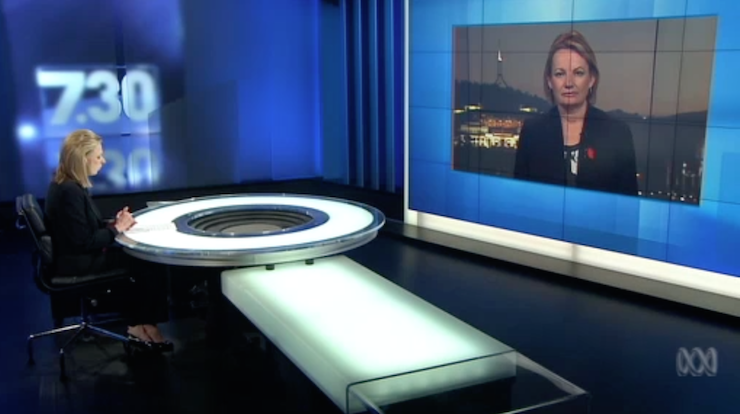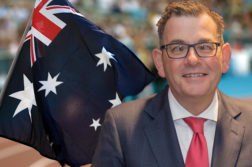As Health Minister Sussan Ley spruiks private health insurance, the Coalition is cutting $800 million from community health care. Ben Eltham reports.
Writing about Australian politics can often be depressing. One of the most difficult things to cope with is the yawning gap between perception and reality. While the Canberra press gallery continues its love affair with new Prime Minister Malcolm Turnbull, most of his predecessor’s policies are still well and truly in place.
Take health policy. It’s not a particularly sexy topic. Health policy is complex, technical and, for most journalists, pretty boring.
But health care is important. For those of us needing high-quality health care, it’s a matter of life and death. Ordinary citizens rate it pretty highly too. Health care is regularly placed at the top of the list of the most important issues facing the nation by voters.
According to the authoritative Australian Election Study, health has been the most important non-economic issue in the past eight federal elections. In 2013, 19 per cent of respondents said health was their most important issue – nearly twice as many as those nominating asylum seekers or tax.
So you’d think our nation’s media would notice if a group of major public health organisations held a “crisis meeting” at the National Press Club in Canberra.
The event featured speakers from three of Australia’s best-known public health groups, led by the Public Health Association of Australia, Michael Moore.
What are they worried about? Cuts to funding. The Abbott government cut $793 million from public health in the 2014 and 2015 budget. The cuts have not been reversed under Turnbull and Morrison.
According to Moore, the effects of these concealed cuts are “killing the health sector.”
“Under threat are areas like chronic disease prevention, health protection, alcohol and other drug treatment and some rural health sector funds, as well as initiatives in key areas such as health workforce, capacity building, communicable disease and health surveillance,” he said in his Press Club address.
“Some people believe ‘prevention is better than cure’,” Moore pointed out. “These cuts suggest the opposite.”
The cuts come from the Health budget’s so-called ‘Flexible Funds‘. Despite their confusing name, flexible funds are key line items of the federal health budget, funding a range of critical programs across the health sector. Everything from dementia treatment (already Australia’s second-leading cause of death) to Indigenous health care will be affected.
Ironically, despite the government’s stern rhetoric on the supposedly devastating methamphetamine epidemic, the cuts to the Flexible Funds will even slash support for programs combating substance abuse. Remember that next time you hear a Turnbull government minister banging on about the “scourge of ice.”
Chronic disease treatment is also under threat. According to Croakey’s Jennifer Doggett, who attended the event, “the need for our health system to improve the way in which it deals with chronic diseases was a key theme discussed by all the speakers and supported by the audience.”
“A number of examples were provided of successful cross-disciplinary programs targeting chronic diseases which are now in danger, due to the planned cuts,” Doggett reported.
But public awareness of the public health funding cuts remains desperately low.
There was practically no coverage of yesterday’s crisis meeting in Canberra. A quick Google News search discovered precisely zero hits for reports on the meeting today. Only dedicated health blog Croakey bothered to report on it, once again showing the irreplaceable value of that platform. The last time the media reported on the cuts to the Flexible Funds in any detail was in May, just after the federal budget.
Health Minister Sussan Ley was on the ABC’s 7.30 last night. Sure enough, Leigh Sales didn’t ask her a single question about the Flexible funding cuts. Instead she asked Ley about her new review of private health insurance.

Of course, there’s no doubt that the private health insurance review is important. But it’s important mainly because the private health insurance rebate is such a bad policy. At a cost of $6 billion a year to the taxpayer, it brings no demonstrated health benefits.
In last night’s 7.30 interview, Ley showed once again that she is struggling in the Health portfolio. For instance, despite announcing a review of private health insurance, she seems to have little understanding of how private health insurance in Australia actually works.
Sales asked her to explain why we call it “private” health insurance at all, given the government spends $6 billion a year subsidising private health insurance for consumers.
Ley responded:
The reason why we, our side of politics, introduced the private health insurance rebate was to encourage people to take up private health insurance, to do exactly what I just suggested we absolutely have to focus on, which is to keep the public system strong by encouraging those who could afford it to take up private health insurance.
You couldn’t get a better example of the confused logic of private health insurance rebates. Ley’s argument – which has long been the Coalition’s position – is that we’re keeping the public system strong by spending up big on private health insurance.
Unfortunately, this is simply not true.
There is no rigorous evidence that private health insurance rebates “take the pressure off” the public system. As health policy expert Anne-Marie Boxall pointed out in March, the available research on the private health rebate has shown that it actually worsens public hospital waiting lists.
As most experts on health policy agree, private health insurance does nothing to help the public sector. The reason is simple: private health insurance doesn’t deliver better health outcomes.
If it did, health systems like America, which are almost completely private, would outperform mostly public systems, like Australia’s.
The opposite is true. As Ian McAuley argued this week, “the standout example of a country that has relied on private insurance is the US, where health care absorbs 18 per cent of GDP, compared with 9 per cent in countries with single national insurers.” But the US has lower life expectancy and worse population health outcomes than Australia.
In her 7.30 interview last night, Ley also told Sales that the government was not considering allowing private health insurers to get into offering services like GP consultations to their customers. “People are anticipating that we might allow private health insurance into primary care, into your GP doctor’s surgery,” Ley said. “Absolutely not. We are not doing that.”
But, in fact, the government has been doing exactly that behind the scenes.
Health insurers were allowed to tender for involvement in the government’s disastrous Primary Health Networks, which New Matilda investigated in June.
In August this year, the government released a discussion paper on primary health. Buried deep in the report was this paragraph:
Private health insurers could be more effectively engaged in the care planning process. Options could be developed to increase collaboration between private health insurers and primary health care providers, including ensuring that any additional services supported through private health insurance are effectively managed by the patient’s main primary health care provider and in a way that avoids duplication.
Translation? The government wants to allow private health insurers intro primary care.
In fact, the government’s agenda of privatising the health system is barely disguised. Sussan Ley’s community survey on health insurance even asks consumers whether they would like to see GP visits covered by health insurance. That’s led some to compare the survey to a push poll.
Of course, none of this addresses the most pressing current issue in our health system: the crisis in public health created by the Coalition’s $800 million cuts to the Flexible Funds.
New Matilda understands there have been dozens of redundancies in a number of health organisations funded through the Flexible Funds already, including the Royal District Nursing Service.
But in our increasingly dumbed-down media you won’t hear much about these funding cuts. Meanwhile, the government continues to slowly hollow-out Medicare, one of the most successful health systems in the world.
* PLEASE CONSIDER SUBSCRIBING TO SUPPORT INDEPENDENT MEDIA. We rely almost entirely on readers subscriptions for our survival.
Donate To New Matilda
New Matilda is a small, independent media outlet. We survive through reader contributions, and never losing a lawsuit. If you got something from this article, giving something back helps us to continue speaking truth to power. Every little bit counts.





